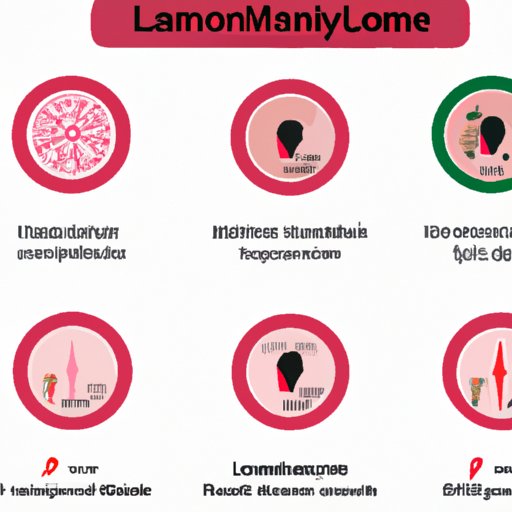
Introduction
Understanding lymphoma symptoms is crucial for early detection and successful treatment. Lymphoma is a cancer that affects the lymphatic system, which is an important part of the body’s immune system. It can affect people of all ages, and early diagnosis is the key to successful treatment. In this article, we will take a comprehensive look at lymphoma symptoms, how they affect the body, and how to identify warning signs early on.
A Comprehensive Guide to Understanding Lymphoma Symptoms
Lymphoma symptoms can range from mild to severe and can develop slowly or rapidly, depending on the type of Lymphoma. There are two main types of lymphoma: Hodgkin’s lymphoma and non-Hodgkin’s lymphoma.
Both types of lymphoma can develop in lymph nodes, bone marrow, spleen, or other organs and tissues in the body. Lymphoma cells can often spread from one part of the body to another, making early detection essential. The following section provides an overview of the different types of lymphoma and how they affect the body.
How to Identify the Symptoms of Lymphoma Early On
Early detection of lymphoma is critical for effective treatment. Understanding the early symptoms of lymphoma can help in identifying the potential risk of developing cancer at earlier stages. The following are some of the early signs that you should look out for:
- Swollen lymph nodes in the neck, armpits, groin, or other areas of the body
- Fatigue and general weakness
- Unexplained weight loss
- Night sweats and fever
- Persistent itching
It is important to conduct self-examinations at least once per month to check for any lumps or changes in the lymph nodes. This process is simple and requires only a few minutes to check for any abnormalities.
The Warning Signs of Lymphoma: What You Need to Know
While some symptoms of lymphoma may be mild at the early stages, untreated lymphoma may progress and lead to more severe symptoms. These symptoms can be categorized as warning signs that lymphoma is progressing and spreading. The following are the most common warning signs to look out for:
- Chest pain or difficulty breathing
- Swelling in the abdomen
- Persistent cough
- Difficulty in swallowing
- Seizures, memory loss, or confusion
- Pain in lymph nodes after drinking alcohol
If you experience any combination of these symptoms, it is essential to seek medical attention immediately, as they may indicate a more progressive stage of lymphoma. Early treatment can help to control the disease before it progresses to a more dangerous stage.
A Closer Look at the Common Symptoms of Lymphoma
The symptoms of lymphoma vary depending on the type and stage of the disease. Some people may not experience any symptoms initially, while some may experience an array of symptoms.
The most common symptoms of lymphoma include:
- Swollen lymph nodes
- Fatigue and weakness
- Unexplained weight loss
- Night sweats
- Fever
- Itching
- Shortness of breath
- Chest pain
- Abdominal pain and swelling
The symptoms of lymphoma can affect any part of the body, including the brain, bones, and skin. Therefore, it is important to discuss any signs with your primary care physician to determine any potential diagnostic tests that may be needed.
Knowing the Key Symptoms of Lymphoma: Early and Accurate Diagnosis
The key to early and accurate diagnosis begins with recognizing the symptoms of lymphoma and bringing them to the attention of a medical professional. If there is a suspicion of lymphoma, the doctor may recommend diagnostic tests to confirm the diagnosis. These may include blood tests, medical imaging studies, or a biopsy to confirm the type of cancer.
Early detection allows doctors to tailor the treatment plan to the patient’s needs. Depending on specifics for the patient and stage of the disease, treatment regimens include chemotherapy, radiation therapy, and stem-cell transplantation, among others. A medical professional should oversee the treatment process to ensure its effectiveness.
Conclusion
Lymphoma symptoms are diverse and can vary from person to person. Understanding the warning signs of lymphoma, identifying symptoms early, and seeking medical treatment can all lead to more effective treatments and better patient outcomes. At all stages of lymphoma, it’s important to stay in communication with your medical professionals to make sure you’re doing everything you can to treat the disease as it develops.
Regular health checkups with a primary care physician and lymphoma screenings are essential for early detection. If you experience any lymphoma symptoms, seek help from a medical professional immediately. Early detection and treatment can help prevent the onset of severe symptoms and improve your chances of remission.




